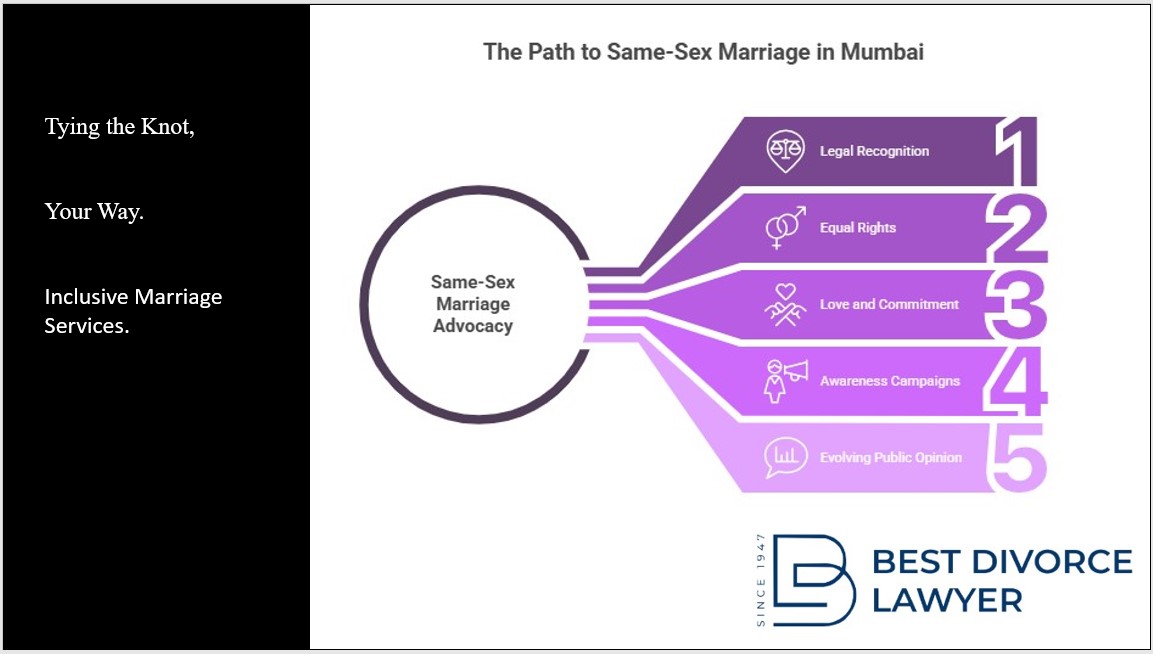Introduction
Same-sex marriage remains a critical yet unresolved issue in India, where tradition and modernity collide. Mumbai, India’s financial capital and a melting pot of cultures, is a key center for LGBTQ+ advocacy. As of June 2025, same-sex marriage is not legally recognized in India, but Mumbai’s vibrant queer community and progressive ethos drive the push for change. This blog examines the legal status of same-sex marriage in Mumbai, judicial milestones, societal challenges, local resources, and future prospects.

Current Legal Status of Same-Sex Marriage in Mumbai
India’s marriage laws, including the Hindu Marriage Act, 1955, and Special Marriage Act, 1954, define marriage as a heterosexual union, excluding same-sex couples. In Mumbai, where diverse communities coexist, these laws prevent same-sex couples from accessing marriage-related rights like inheritance and adoption. Mumbai’s Bandra Family Court adheres to these laws, forcing same-sex couples to rely on informal arrangements like cohabitation agreements.
Mumbai’s cosmopolitan culture, with its film industry and global exposure, fosters a progressive environment, making it a hub for same-sex marriage advocacy. Events like the Mumbai Queer Pride Parade amplify the call for legal recognition.
Key Judicial Milestones Impacting Mumbai
Mumbai’s legal landscape has been shaped by:
- Navtej Singh Johar v. Union of India (2018): The Supreme Court decriminalized homosexuality, empowering Mumbai’s LGBTQ+ community to advocate for marriage rights.
- Supriyo v. Union of India (2023): The Supreme Court deferred same-sex marriage to Parliament but urged non-discrimination and social security benefits.
- Transgender Persons (Protection of Rights) Act, 2019: This act supports transgender rights, sparking discussions on gender-neutral laws in Mumbai.
Personal Laws and Their Limitations in Mumbai
Mumbai’s diverse population adheres to:
- Hindu Marriage Act, 1955: Excludes same-sex couples, prevalent in areas like Dadar.
- Special Marriage Act, 1954: Limits marriage to “male” and “female” partners.
- Muslim and Christian Laws: Define marriage as heterosexual, applied in areas like Bandra and Malad.
These laws restrict same-sex marriage in Mumbai’s family courts.
Societal and Cultural Challenges in Mumbai
Mumbai’s social dynamics present challenges:
- Religious Opposition: While urban centers like Mumbai often showcase a more liberal façade, deep-seated religious beliefs continue to shape perceptions of marriage. For many adherents of Hinduism, Islam, and Christianity, the sacred texts and traditional interpretations define marriage exclusively as a union between a man and a woman, primarily for procreation and the continuation of lineage. This theological stance often translates into resistance to any redefinition, making the acceptance of same-sex marriage a significant challenge for a large segment of the population, including those living in Mumbai.
- Family Pressure: In residential pockets of Mumbai, such as Borivali, where community ties and traditional values often remain robust, the pressure to conform to heterosexual marriage norms is particularly intense. Families often view marriage not just as a union of two individuals but as a sacred alliance between two families, with expectations of progeny and upholding societal traditions. For LGBTQ+ individuals in such areas, coming out or pursuing a same-sex relationship can lead to immense familial disapproval, social ostracization, and even forced heterosexual marriages, as families prioritize what they perceive as upholding reputation and tradition over individual autonomy and happiness.
- Urban-Rural Divide: Mumbai, despite its metropolitan image, exhibits a significant urban-rural divide in social attitudes, which profoundly impacts the acceptance of same-sex relationships and marriage. South Mumbai, with its cosmopolitan population, liberal education, and exposure to global ideas, tends to be more open and accepting of diverse sexualities and gender identities. This area often hosts LGBTQ+ events and has visible safe spaces. In stark contrast, suburban regions like Thane, while technically part of the Mumbai Metropolitan Region, often retain more conservative values, mirroring semi-urban or even rural mindsets. Here, traditional gender roles are more rigid, and societal norms are less tolerant of non-heteronormative relationships, leading to greater social stigma and less support for same-sex couples.
Legal Rights for Same-Sex Couples in Mumbai
Mumbai’s same-sex couples can access:
- Cohabitation Rights: Recognized live-in relationships offer tenancy protections.
- Anti-Discrimination Protections: Protection from harassment based on sexual orientation.
- Adoption and Succession: Individual adoption is allowed, but joint adoption is not.
The Maharashtra State Legal Services Authority (MSLSA) supports these rights.
City-Specific Support Systems in Mumbai
Mumbai offers:
- MSLSA: Free legal aid for LGBTQ+ individuals.
- NGOs: Humsafar Trust and Queer Azaadi Mumbai provide counseling and legal aid.
- Pride Events: Mumbai Queer Pride Parade in Bandra promotes advocacy.
Future Prospects for Same-Sex Marriage in Mumbai
Mumbai’s path forward includes:
Legis
Challenges to Legalization
- Political Resistance: Conservative voter bases in Mumbai’s suburbs.
- Religious Pushback: Opposition from religious institutions.
- Legal Complexity: Harmonizing personal laws.
Potential Pathways Forward
- Incremental Reforms: Granting cohabitation and inheritance rights.
- Public Awareness: Leveraging Mumbai’s film industry for advocacy.
- International Influence: Global advocacy impacts Mumbai.
Conclusion
The journey towards marriage equality for same-sex couples in India is a complex and evolving one. While the Supreme Court’s 2018 decriminalization of homosexuality was a landmark victory for LGBTQ+ rights, the subsequent decision in October 2023 to leave the legalization of same-sex marriage to Parliament highlights the ongoing challenges. Mumbai’s progressive culture and active NGOs like Humsafar Trust position it as a leader in same-sex marriage advocacy.
For legal assistance, call +91 9461620006 or visit www.bestdivorcelawyer.in today!


